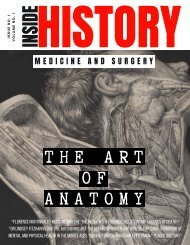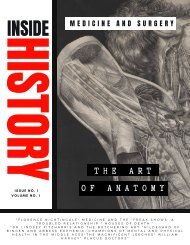Inside History: Protest. Revolt & Reform
For our next issue we take a closer look at the theme of Protest from the events of Peterloo to the fall of the Berlin. Inside we cover a whole range of historical protests and the individuals who led the charge for change. This issues includes: John Brown's raid on Harpers Ferry, The Suffragettes, Billie Holiday and the role music has played in protests, The Civil Rights Movement, Protest and Sport, We are the People: The Fall of the Berlin Wall, Bloody Sunday at Trafalgar Square, and much much more.
For our next issue we take a closer look at the theme of Protest from the events of Peterloo to the fall of the Berlin. Inside we cover a whole range of historical protests and the individuals who led the charge for change. This issues includes:
John Brown's raid on Harpers Ferry, The Suffragettes, Billie Holiday and the role music has played in protests, The Civil Rights Movement, Protest and Sport, We are the People: The Fall of the Berlin Wall, Bloody Sunday at Trafalgar Square, and much much more.
- No tags were found...
Create successful ePaper yourself
Turn your PDF publications into a flip-book with our unique Google optimized e-Paper software.
“Remember the
dignity of your
womanhood. Do
not appeal, do not
beg, do not grovel.
Take courage, join
hands, stand
besides us, fight
with us.”
Square where Christabel addressed a large
crowd of protestors. The three women were
later arrested and Christabel received a tenweek
prison sentence.
By 1909, pressure was building on the
government as it faced increasingly dangerous
tactics from the WSPU. Its strategies became
more extreme, with members going on hunger
strikes in prison and throwing stones at the
windows of government buildings. Therefore,
during his election campaign in January 1910,
Prime Minister H.H. Asquith intended to pass a
Conciliation Bill which would grant one million
women who owned property over the value
of £10 the vote. Indeed, this was a limited
amount of women, but it was a hopeful
development according to Christabel, who
decided to call a ‘truce’ by ceasing all militant
activity. However, this was short-lived and
hopes were brought to an end in June 1910,
when Asquith refused to allocate further
parliamentary time to the bill and dissolved
Parliament in November to hold a general
election. After this, the bill was never passed as
law.
With Christabel and Emmeline feeling betrayed
and tensions building, 300 members of the
WSPU stormed Parliament on November 18,
1910. Annie Kenney described the event as a
huge turning point, writing: “All the clouds that
had been gathering for weeks suddenly broke,
and the downpour was terrific. There was not
We are here to claim our
right as women, not only
to be free, but to fight for
freedom. That it is our
right as well as our duty.
Votes for Women 31 March 1911
INSIDE HISTORY 27

















